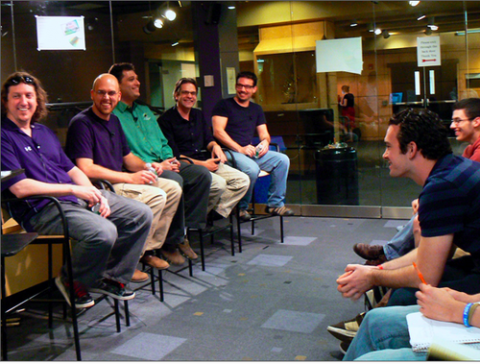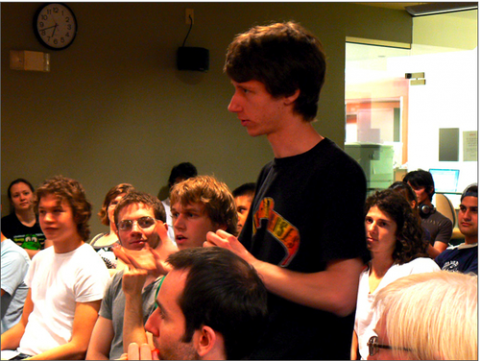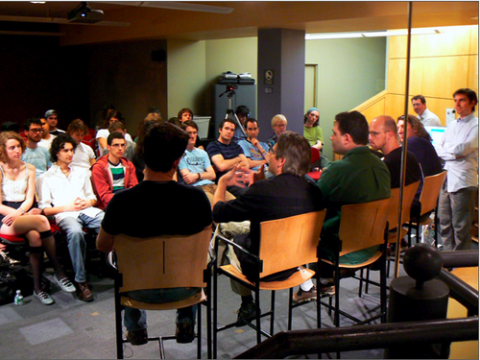Video Game Demo Derby

The panel, from left to right: Scott Haraldsen, Jim Bonney, Gene Rozenberg, Michael Sweet, and Duncan Watt.
Photo by Spring Liu

Student Alex Liberatore asks a question.
Photo by Spring Liu

The panel addresses a packed house.
Photo by Spring Liu
As video games continue to grow in the public eye as both an expanding market and a new creative outlet, Berklee's involvement seems to be growing right along. At the end of April, the Media Center hosted the college's first official Demo Derby.
Every March, game developers, programmers, composers—really, anyone involved in the industry—gather in San Francisco for the Game Developers Conference. The event is part expo, part clinic, with speeches, tutorials, demos, and the like. One of the most prominent parts is the Game Audio Network Guild (G.A.N.G.) Music Demo Derby, in which a panel of professionals from across the industry listen to and critique audio demos submitted by both professional and amateur G.A.N.G. members.
Many months and emails later, Berklee's Video Game Music Club was fortunate enough to host its first very own Demo Derby. Students could submit a 60-second audio track ahead of time to a panel of distinguished names in game audio: Jim Bonney, audio designer, 2K Boston; Scott Haraldsen, audio lead, 2K Boston; Gene Rozenberg, composer/sound designer, 38 Studios; Michael Sweet, Berklee interactive music professor and game audio designer; and Duncan Watt, composer of Brothers in Arms: Hell's Highway, among others.
Each demo was pitched by the composer and listened to by the panel and the audience, after which the panel offered feedback. Because its members held a range of positions, each suggestion and piece of advice built off the others, creating a comprehensive analysis. Opinions sparked debates between panelists, further increasing the knowledge gained. The demos contrasted sharply in genre, instrumentation, and composer intent, which led to a great collection of diverse feedback.
Participant Giancarlo Feltrin said, "[The derby] was insightful and effectively realistic. I was honored to play an original composition in front of such accomplished individuals, and their critiques encouraged me as well as other composers to strive for innovation in the game audio industry." His piece, a heavier electronic tune with a lighter acoustic guitar motif, got useful comments on mixing and instrumentation, as well as advice on pitching a project to potential employers.
The incredible opportunity to get firsthand professional feedback was not lost on any of the students. Although the gaming industry is new to the college environment, Berklee has come very far in the past two years in acknowledging and integrating game audio into its curriculum. The Video Game Music Club, started by Filippo Beck Peccoz in 2006, has grown rapidly and has over 150 members at present. Since the club's start, students and faculty have worked hard to bring members from as many areas of the industry as possible to share their insight.
Overall, the panelists were very impressed with the demos. The overarching opinion seemed to be that composers should offer the best they have. A demo nowadays is much more than the name implies: Mixing, sampling, and production quality must be high in order to compete. In addition, verbal presentation and communication skills are key.
The derby was invaluable for observers as well. Akash Thakkar, who didn't submit a demo, said, "Attending the event was a great experience. It was very educational to hear feedback from five of Massachusetts's top video game audio professionals. I hope to see more events like this at Berklee soon." As do the rest of us!
